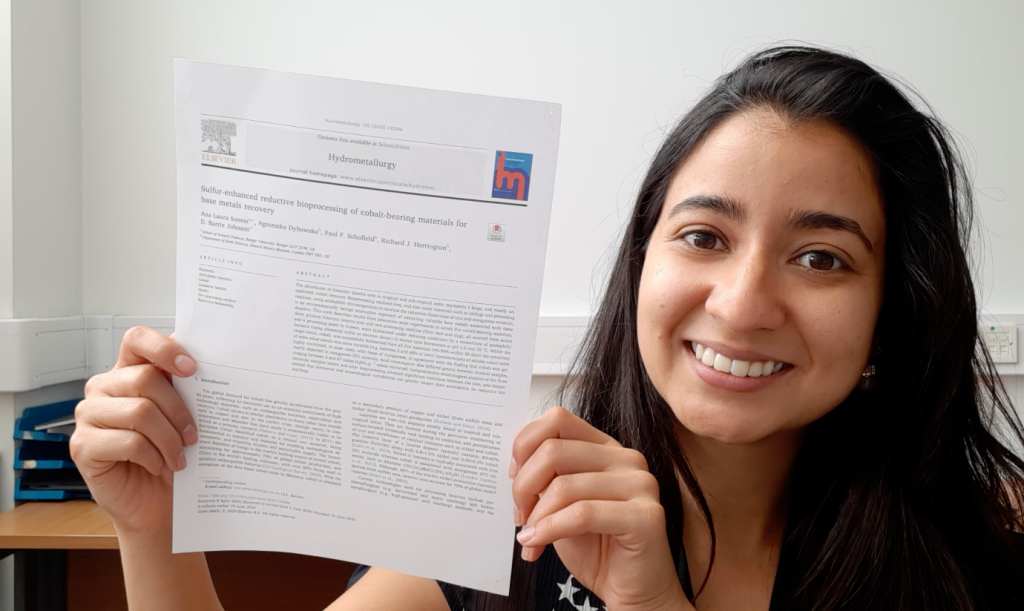 Bangor University and Natural History Museum, UK, partners in the CROCODILE project, have developed a bioprocess for recovery of base metals, mainly cobalt and nickel, from oxidised ores and waste materials using a consortium of acidophilic bacteria. Target metals were successfully extracted, and mineralogical analysis of the limonitic laterites before and after bioprocessing revealed significant variations between the ores. This process is an environmentally benign alternative approach of extracting valuable base metals associated with these deposits.
Bangor University and Natural History Museum, UK, partners in the CROCODILE project, have developed a bioprocess for recovery of base metals, mainly cobalt and nickel, from oxidised ores and waste materials using a consortium of acidophilic bacteria. Target metals were successfully extracted, and mineralogical analysis of the limonitic laterites before and after bioprocessing revealed significant variations between the ores. This process is an environmentally benign alternative approach of extracting valuable base metals associated with these deposits.
The abundance of limonitic laterite ores in tropical and sub-tropical areas represents a large, and mostly unexploited, cobalt resource. Bioprocessing oxidised ores, and also waste materials such as tailings and processing residues, using acidophilic microorganisms to catalyse the reductive dissolution of iron and manganese minerals, is an environmentally benign alternative approach of extracting valuable base metals associated with these deposits. This work describes results from laboratory-scale experiments in which five cobalt-bearing materials, three primary limonitic laterite ores and two processing residues (filter dust and slag), all sourced from mines and a processing plant in Greece, were bioleached under reducing conditions by a consortium of acidophilic bacteria (using elemental sulfur as electron donor) in stirred tank bioreactors at pH 1.5 and 35 °C. Whilst the target metal, cobalt, was successfully bioleached from all five materials (40–50% within 30 days) the extraction of some other metals was more variable (e.g. between 2 and 48% of iron).
Concentrations of soluble cobalt were highly correlated, in most cases, with those of manganese, in agreement with the finding that cobalt was primarily deported in manganese (IV) minerals. Acid consumption also differed greatly between mineral samples, ranging between 3 and 67 moles H2SO4 g−1 cobalt extracted. The bioleaching approach described in this work showed that the acid consumption can be reduced by ~ 40% compared to chemical (acid) leaching. Comprehensive mineralogical analysis of the three limonitic samples before and after bioprocessing revealed significant variations between the ores, and demonstrated that elemental and mineralogical variabilities can greatly impact their amenability for reductive bioleaching.
Full reference paper
Ana Laura Santos, Agnieszka Dybowska, Paul F. Schofield, Richard J. Herrington, D. Barrie Johnson (2020) Sulfur-enhanced reductive bioprocessing of cobalt-bearing materials for base metals recovery. Hydrometallurgy. doi: 10.1016/j.hydromet.2020.105396
Biography Dr Ana Laura Santos
 Dr Ana Laura Santos is a Research Officer working with Prof. D. Barrie Johnson at the Bangor Acidophile Research Team, Bangor University, UK. PhD in Biological Sciences, Dr Santos joined the CROCODILE project in 2018 to investigate the development of a novel mineral bioprocessing technology for cobalt extraction. Her research interests are focused on bioleaching of sulfide/oxide minerals and bioremediation of metal-contaminated waters and acid mine drainage.
Dr Ana Laura Santos is a Research Officer working with Prof. D. Barrie Johnson at the Bangor Acidophile Research Team, Bangor University, UK. PhD in Biological Sciences, Dr Santos joined the CROCODILE project in 2018 to investigate the development of a novel mineral bioprocessing technology for cobalt extraction. Her research interests are focused on bioleaching of sulfide/oxide minerals and bioremediation of metal-contaminated waters and acid mine drainage.
Acknowledgements
This research leading to this publication is part of the CROCODILE project which received funding from the European Union’s EU Framework Programme for Research and Innovation Horizon 2020 under Grant Agreement No 776473 (CROCODILE). Website: https://h2020-crocodile.eu/.


